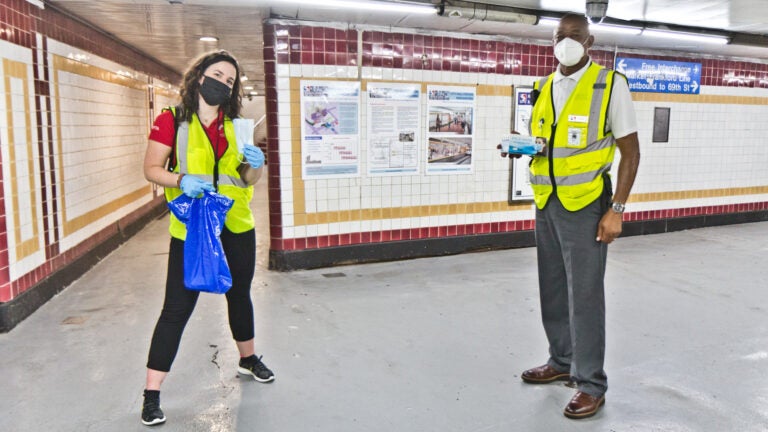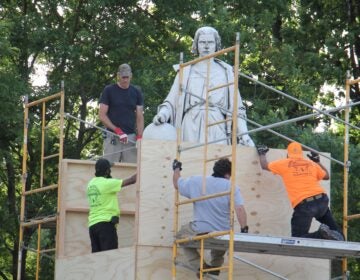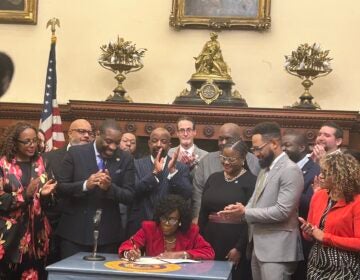‘Would you like a mask?’ SEPTA social distancing coaches encourage safety, avoid conflict
SEPTA’s new squad of safety coaches hand out masks. Many riders happily accept. Others keep walking.

Jessica Mangold (left) and Leon Vaughn (right) are SEPTA social distancing coaches who hand out masks and encourage riders to stay safe during the pandemic. (Kimberly Paynter/WHYY)
Popping up at SEPTA stations all over the city are people clad in bright yellow vests and holding boxes of disposable face masks. For a few hours at a time, the entire responsibility of these agency employees is to promote mask-wearing and social distancing on Philly’s public transit network.
But with an incredibly light touch.
Called social distance coaches, the SEPTA staffers aren’t supposed to correct people’s behavior. They aren’t supposed to tell people to wear masks or to stay six feet apart. There’s essentially just one proactive thing they can do: Hand out fresh masks.
This pandemic pilot program is a branch of SEPTA’s existing ambassador program, which asks employees across the agency — from station managers to paralegals to assistant general managers — to volunteer to help riders as needed. They’ve been tapped in the past, during the rollout of the SEPTA Key card, for example, when lots of riders had questions, or for big events like the annual Flower Show.
Introduced just a few months after Philly police forcibly removing a man from a SEPTA bus because he refused to don a mask, this SEPTA program is designed to encourage safe behavior without provoking conflict. In June, the agency made masks mandatory for riders, but the mandate is not being enforced, according to SEPTA.
“There’s that the old saying, you catch more bees with honey,” said Leon Vaughn, a SEPTA station manager who volunteered as a social distance coach. “That’s just my way of thinking.”
Coaches offer solutions and provide reminders, but don’t enforce
Catch the coaches on the job for just one shift and you’ll easily memorize their script.
“Would you like a mask? Would you like a mask? Would you like a mask?” Each coach repeats the line hundreds of times each shift, and hands out a few dozen face coverings per hour. At City Hall Station on Tuesday afternoon, Jessica Mangold, SEPTA’s statistical reporting project manager who’s volunteering as a coach, kept having to refresh her supply.
Even when she observed riders standing too close together, those who weren’t wearing masks or whose masks were hanging on their chin, Mangold offered the same refrain:
“When I see someone with their mask dipped below, I say, ‘Would you like a mask?’” Mangold said. “Most often they’ll be like, ‘No, I’m fine,’ and they pull it up. That’s my gentle reminder.”
Rider responses varied.
Some enthusiastically took one of the disposable face coverings for later. One rider who didn’t need a new mask still yelled an enthusiastic “thank you” to the coaches from 10 feet away.
Some, reminded of the mask-wearing mandate, realized their face coverings were hanging around their neck. They sheepishly pulled them up. A few riders declined — even those who aren’t wearing masks at all. Most people — including some with bare faces — walked past the coaches and said nothing.
The coaches, for their part, let them pass by.
“We’re out there not to correct the way people are acting,” Mangold said. “We don’t want anyone getting into any kind of confrontation. We’re just out there to provide support if needed.”
It’s more effective that way, Vaughn said.
“This type of work, if you don’t stay upbeat, you can easily get stressed out,” he said. “In my own little way, I’ll suggest that they take a mask. If anything, they’re reminded the mask is supposed to be not over their chin but over their mouth and nose.”
Omari Bervine, president of SEPTA’s police union, cosigned Vaughn’s strategy. He said he appreciates the social distance coaches — but he certainly wouldn’t recommend that untrained volunteers try to get into enforcement.
“As police officers, we know how difficult it is to enforce,” Bervine said. “Any added layer of safety that can be provided for our employees, even if it’s just a suggestion that the passenger put on a mask, that’s something we’re always going to be in favor of.”
Sophia Hottel, a 20-year-old fast food worker, takes the Broad Street Line almost every day from her Olney neighborhood. She’s relieved to know SEPTA’s doing something to encourage people to wear masks.
“It’s a great thing that they’re doing that,” Hotel said. “I see a lot of people who aren’t wearing masks in the subway system. I know it makes everyone a lot safer.”
Even with good ventilation, masks are needed to reduce risk
The pandemic is still “a hot button issue” for many people, observed Mangold, one of the coach volunteers.
Though masks have been proven to limit community spread of the coronavirus, some people still don’t want to wear them. Earlier this week, a man and woman punched a 17-year-old Sesame Place employee who reminded them to cover their faces.
That resistance creates problems on SEPTA, where masks are necessary for safety. While subway cars and buses ventilate well, that’s not enough to fully protect riders from potential infection.
“That is not a replacement for people wearing masks and keeping a distance,” Philly Health Commissioner Dr. Tom Farley said, referring to the ventilation system that refreshes airflow on buses and trains.
After bumping into the coaches on Tuesday afternoon, plenty of riders said they’re grateful the program exists.
Jamir Wallace rides the subway to his police dispatcher gig every day. He’ll admit, in his daily rush to work, he’s sometimes left the house without his mask.
“Honest to God, I’ve forgotten my mask a fair share of times,” said the 22-year-old North Philly resident. Normally he’ll pop into a corner store for a second to buy a new one — but he’d much rather snag one for free from a SEPTA coach.
“I think it’s good they’re just reminding people out here to stay safe,” Wallace said. “And they’re actually helping them do it.”
The social distance coaches are the latest in a series of efforts made by SEPTA to reduce COVD-19 risks for riders and staff — a point of contention between the transit authority and the union that represents its workers. In April, by which point four SEPTA employees had died of coronavirus, the Transport Workers Union Local 234 nearly staged a walkout to demand more protections. Since then, the pandemic has claimed the lives of three more SEPTA employees.
This pilot program will last the month of August, staffing stations with coaches for 12 hours per week. The first week, social distance coaches visited stations along the Market-Frankford Line — where a SEPTA survey revealed mask-wearing is the lowest among all transit lines at 63%.
Other American transit agencies have struggled to encourage mask wearing, too. Last month, New York’s Metropolitan Transportation Authority drivers estimated just half their passengers boarded with face coverings. The MTA responded with a program not unlike SEPTA’s that also deploys volunteers to hand out free masks.
This week, SEPTA’s coaches moved to the Broad Street Line. Next, they’ll hit up Center City Regional Rail stations, then finally move to the suburban stations.
“We’re trying to mix it up every week right now, and when the program ends we’ll reevaluate and see what we need to do going forward,” Mangold said.
WHYY is your source for fact-based, in-depth journalism and information. As a nonprofit organization, we rely on financial support from readers like you. Please give today.






![CoronavirusPandemic_1024x512[1]](https://whyy.org/wp-content/uploads/2020/03/CoronavirusPandemic_1024x5121-300x150.jpg)


